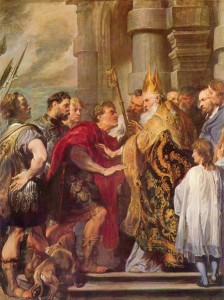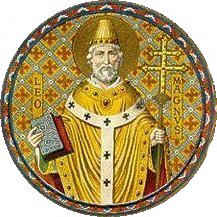H/T to Mark Shea.
In honor of this blog’s, and my personal, patron saint’s feast day today I was going to write a long post on St. Ambrose of Milan. But then I realized that I already wrote one far better than I have time for a couple of years ago. Please, do read and enjoy. As I tell others, if he could help to convert St. Augustine he has a chance with me!
Pope Benedict’s general prayer intention for December is: “That children may be respected and loved and never be the victims of exploitation in its various forms”.
His mission intention is: “That at Christmas the peoples of the earth may recognise in the Word Incarnate the light which illuminates every man, and that the nations may open their doors to Christ, the Saviour of the world”.
Those are, to say the least, some bold intentions. With God, all things are possible. (Mt 19:26)
And a little commentary too. But first, St. Ambrose:
Many apostatizing from Christianity, the brightness of the faith will be dimmed by this cloud of apostasy: since the heavenly Sun grows dim or shines in splendour according to my faith. And as in its monthly eclipse the moon, by reason of the earth coming between it and the sun, disappears from view, so likewise the holy Church, when the vices of the flesh stand in the way of the celestial light, can no longer borrow the splendour of His divine light from the Sun of Christ. And in the persecutions it was invariably the love of this life that stood in the path of the Divine Sun. Also the stars, that is, men surrounded by the praise of their fellow Christians, shall fall, as the bitterness of persecution mounts up; which must however come to pass, until the number of the faithful is made up; for so the good are proved and the weak made known.
And second, St. Ephraem:
Be watchful of they enemy, lest he pierce your heart with some obstinate and unfitting desire. If he seeks to possess your soul as a field, and places there his unclean thoughts, resist and oppose him with the shield of faith. Put on the helmet of hope. Draw the sword of the spirit, which is the word of God. And so armed against the enemy, stand fast, and be not unwatchful in the battle, but show yourself sober and vigilant in all things. For we are not ignorant of his designs. Rejoice always in the Lord, as it is written. Let your modesty be known to all men (Phil iv. 4-5). Let the fear of the Lord have place in your heart. But be not a timid soldier, nor a slothful, lazy workman. Do not reject they crown. Time is short, but judgment is long.
The first thing I noticed in these quotes is just how much more willing the Fathers were to believe it possible for souls to be lost. Today so often we hear only about the great Mercy of God without ever hearing about His Justice. To be sure, Jesus tells us He “did not come to condemn the world but to save the world” (Jn 12:47) but He also warns us not to be like the foolish virgins (Mt 25:1-13) or those found without their wedding garments (Mt 22:1-14).
God’s Mercy is incomplete without His Justice – indeed it cannot make sense. To risk a pun, it is an injustice to talk about God’s Mercy without simultaneously talking about His Justice. After all, without a sense of punishment due to sin what purpose can Mercy serve? So please, all you catechists out there, do God the justice of giving the whole picture. That would be the merciful thing to do.
I can think of no greater venue in southern New Hampshire to focus one’s attention on Christ in the Eucharist than under the Baroque cover of Ste. Marie’s church in Manchester. Even the still in-progress installation of a marble floor for the spacious sanctuary could not distract those present from Him who in His Eucharistic Presence is the source and summit of our faith.
It is something I honestly never thought I’d see in my lifetime – a Kennedy confronted by a New England Bishop. Granted it was not one of the “big names” of the Kennedy clan, but Patrick Kennedy certainly asked for a stern correction. Thanks be to God his Bishop was willing to be pastoral enough to offer him that needed remedy. I hope this letter both serves to bring Mr. Kennedy back to the fullness of his Catholic faith and serve as an example for other Bishops of how to handle politicians or other prominent public personnel who choose to make their differences with the Magisterium a matter of public record. Ad multos annos, Bishop Tobin!
With a H/T to AmP, a celebration of the 50th anniversary of Fr. Benedict Groeschel’s ordination to the priesthood of Jesus Christ:
He was, without a doubt, a tremendous influence on me as I went through the RCIA process lo those many years ago. I found him, repeatedly, not quite fitting into the box in which I wanted to put him. He taught me then, as I continue to learn now, that there is the way of the left, the way of the right and then there is God’s way. It was, quite simply, something I wasn’t entirely ready to learn at that time and even now struggle with. His honesty, humility and tenacity are qualities I can only hope to emulate in some small way. May the Lord bless you Fr. Groeschel, and us, with many more years of service in his vineyard.
I’m still working through my notes on the NH Eucharistic Conference as time allows, but I simply had to share with you the words of Dom Gueranger, OSB on the saint whose memorial we celebrate today. In his The Liturgical Year we find:
One of the grandest Saints in the Church’s Calendar is brought before us to-day. Leo, the Pontiff and Doctor, rises on the Paschal horizon, and calls for our admiration and love. As his name implies, he is the Lion of Holy Church; thus representing, in his own person, one of the most glorious of our Lord’s titles. There have been thirteen Popes who have had this name, and five of the number are enrolled in the catalogue of Saints; but not one of them has so honoured the name as he whose feast we keep to-day: hence he is called ‘Leo the Great.’
He deserved the appellation by what he did for maintaining the faith regarding the sublime mystery of the Incarnation. The Church had triumphed over the heresies that had attacked the dogma of the Trinity, when the gates of hell sought to prevail against the dogma of God having been made Man. Nestorius, a bishop of Constantinople, impiously taught that there were two distinct Persons in Christ – the Person of the Divine Word, and the Person of Man. The Council of Ephesus condemned this doctrine, which, by denying the unity of Person in Christ, destroyed the true notion of the Redemption. A new heresy, the very opposite of that of Nestorianism, but equally subversive of Christianity, soon followed. The monk Eutyches maintained that in the Incarnation the human nature was absorbed by the Divine. The error was propagated with frightful rapidity. There was needed a clear and authoritative exposition of the great dogma, which is the foundation of all our hopes. Leo arose, and, from the Apostolic Chair, on which the Holy Ghost had placed him, proclaimed with matchless eloquence and precision the formula of the ancient faith – ancient indeed, and ever the same, yet ever acquiring greater and fresher brightness. A cry of admiration was raised at the General Council of Chalcedon, which had been convened for the purpose of condemning the errors of Eutyches. ‘Peter,’ exclaimed the Fathers, ‘Peter has spoken by the mouth of Leo!’ […]
The barbarian hordes were invading the West; the Empire was little more than a ruin: and Attila, ‘the Scourge of God,’ was marching on towards Rome. Leo’s majestic bearing repelled the invasion, as his word had checked the ravages of heresy. The haughty king of the Huns, before whose armies the strongest citadels had fallen, granted an audience to the Pontiff on the banks of the Mincio, and promised to spare Rome. The calm and dignity of Leo – who thus unarmed confronted the most formidable enemy of the Empire, and exposed his life for his flock – awed the barbarian, who afterwards told his people that, during the interview, he saw a venerable person standing in an attitude of defence, by the side of Rome’s intercessor: it was the Apostle St. Peter. Attila not only admired, he feared the Pontiff. It was truly a sublime spectacle, and one that was full of meaning – a priest, with no arms save those of his character and virtues, forcing a king, such as Attila, to do homage to a devotedness which he could ill understand, and recognize by submission the influence of a power which had heaven on its side. Leo, single-handed and at once, did what it took the whole of Europe several ages to accomplish in later times.
He goes on later to ask the Doctor’s intercession, in words as poignant and incisive then as they are now, sixty years after they were first published:
Thou dist triumph over barbarian invaders: Attila acknowledged the influence of thy sanctity and eloquence, by withdrawing his troops from the Christian land they infested. In these our days, there have risen up new barbarians – civilized barbarians, who would persuade us that religion should be eliminated from education, and that the State, in its laws and institutions, should simply ignore our Lord Jesus Christ, the King to whom all power has been given, not only in heaven but on EARTH also. Oh! help us by thy powerful intercession, for our danger is very great. Many are seduced, and have fallen into apostasy, whilst flattering themselves that they are still Christians. Pray that the light that is left within us may not be extinguished, and that the public scandals which now exist may be brought to an end. Attila was but a pagan; our modern statesmen and governments are, or at least call themselves, Christians: have pity on them, and gain for them light to see the precipice to which they are hurrying society.
Assuming it turns out to be what the archaeologists hope it to be of course, that is.
The remains of a mighty Persian army said to have drowned in the sands of the western Egyptian desert 2,500 years ago might have been finally located, solving one of archaeology’s biggest outstanding mysteries, according to Italian researchers.
I was going to post about the NH Eucharistic Conference I was blessed to attend all day yesterday. Unfortunately something seems to have tripped my allergies. Suffice it for now to say it was an awesome experience. That, and the folks at Magdalen College have every reason to be very proud of their choir. It is rare I can’t find a simple wrapper to put around something like this, but I find myself still contemplating the whole experience.




